
Let Them Die By Kenan Malik From Prospect,November 2000
Let Them Die By Kenan Malik From Prospect, November 2000

Words and Structure expressing the extinction of language When she dies,so will her language. ·Die 。Take.to the grave ·Kill off ·Pass away 。Disappear
Words and Structure expressing the extinction of language • When she dies, so will her language. • Die • Take…to the grave • Kill off • Pass away • Disappear
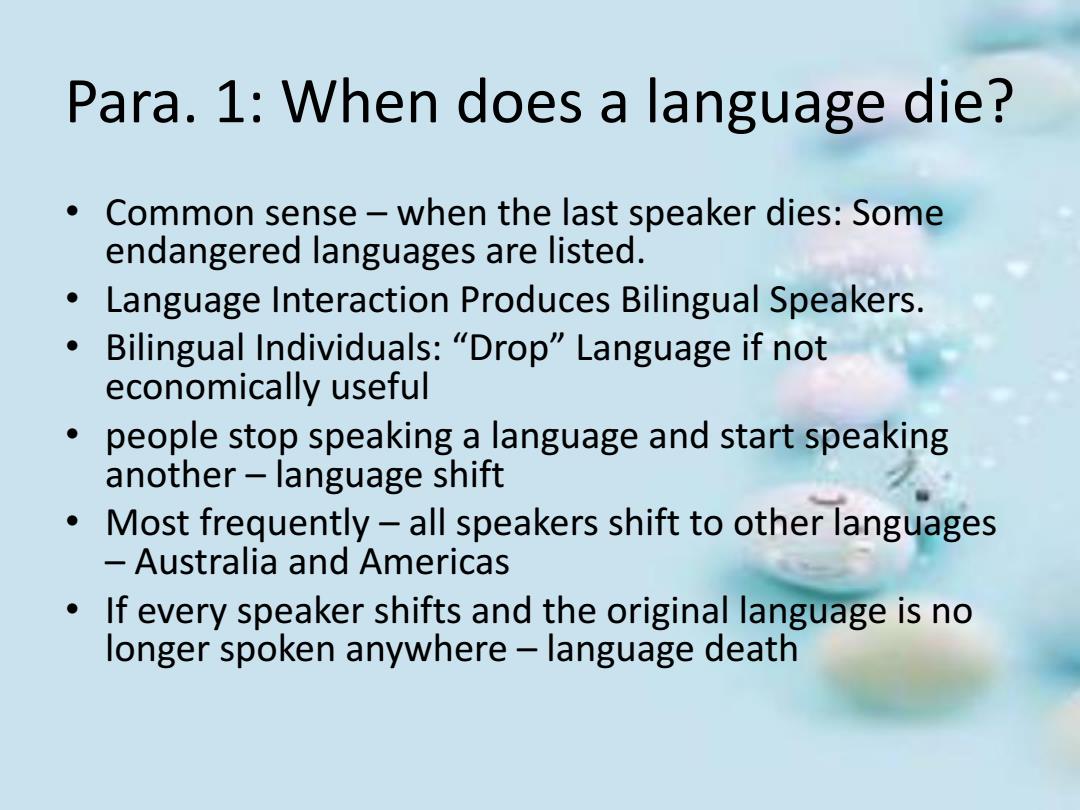
Para.1:When does a language die? Common sense-when the last speaker dies:Some endangered languages are listed. Language Interaction Produces Bilingual Speakers. Bilingual Individuals:"Drop"Language if not economically useful people stop speaking a language and start speaking another-language shift Most frequently-all speakers shift to other languages -Australia and Americas If every speaker shifts and the original language is no longer spoken anywhere-language death
Para. 1: When does a language die? • Common sense – when the last speaker dies: Some endangered languages are listed. • Language Interaction Produces Bilingual Speakers. • Bilingual Individuals: “Drop” Language if not economically useful • people stop speaking a language and start speaking another – language shift • Most frequently – all speakers shift to other languages – Australia and Americas • If every speaker shifts and the original language is no longer spoken anywhere – language death
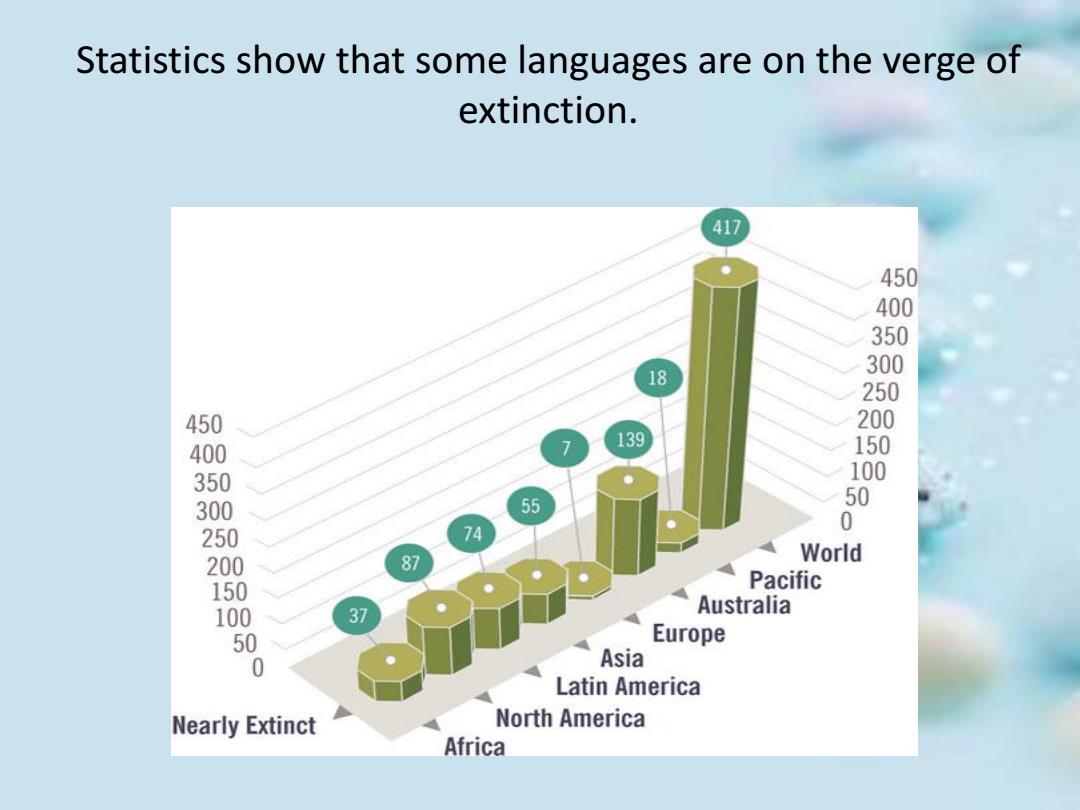
Statistics show that some languages are on the verge of extinction. 417 450 0汤 18 250 450 139 400 8 350 100 300 55 5 250 74 87 World Pacific 1 37 Australia 5 Europe 0 Asia Latin America Nearly Extinct North America Africa
Statistics show that some languages are on the verge of extinction
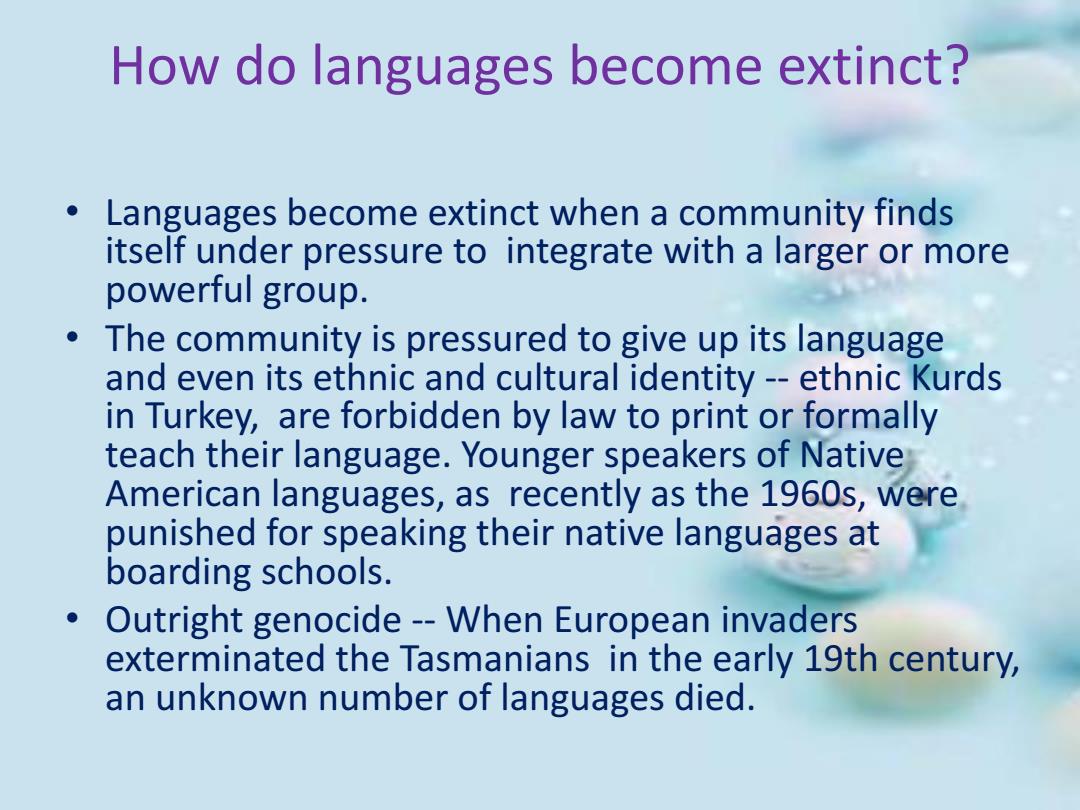
How do languages become extinct? Languages become extinct when a community finds itself under pressure to integrate with a larger or more powerful group. The community is pressured to give up its language and even its ethnic and cultural identity--ethnic Kurds in Turkey,are forbidden by law to print or formally teach their language.Younger speakers of Native American languages,as recently as the 1960s,were punished for speaking their native languages at boarding schools. Outright genocide--When European invaders exterminated the Tasmanians in the early 19th century, an unknown number of languages died
How do languages become extinct? • Languages become extinct when a community finds itself under pressure to integrate with a larger or more powerful group. • The community is pressured to give up its language and even its ethnic and cultural identity -- ethnic Kurds in Turkey, are forbidden by law to print or formally teach their language. Younger speakers of Native American languages, as recently as the 1960s, were punished for speaking their native languages at boarding schools. • Outright genocide -- When European invaders exterminated the Tasmanians in the early 19th century, an unknown number of languages died
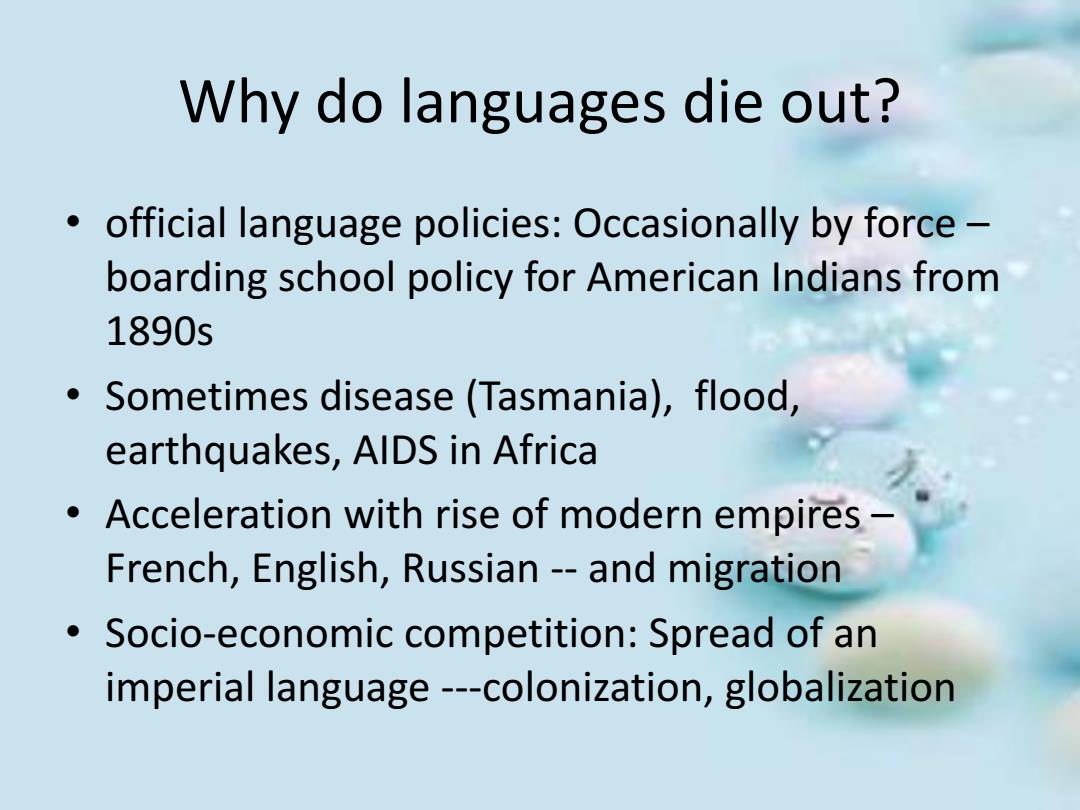
Why do languages die out? official language policies:Occasionally by force- boarding school policy for American Indians from 1890s Sometimes disease(Tasmania),flood, earthquakes,AlDS in Africa Acceleration with rise of modern empires- French,English,Russian--and migration Socio-economic competition:Spread of an imperial language ---colonization,globalization
Why do languages die out? • official language policies: Occasionally by force – boarding school policy for American Indians from 1890s • Sometimes disease (Tasmania), flood, earthquakes, AIDS in Africa • Acceleration with rise of modern empires – French, English, Russian -- and migration • Socio-economic competition: Spread of an imperial language ---colonization, globalization
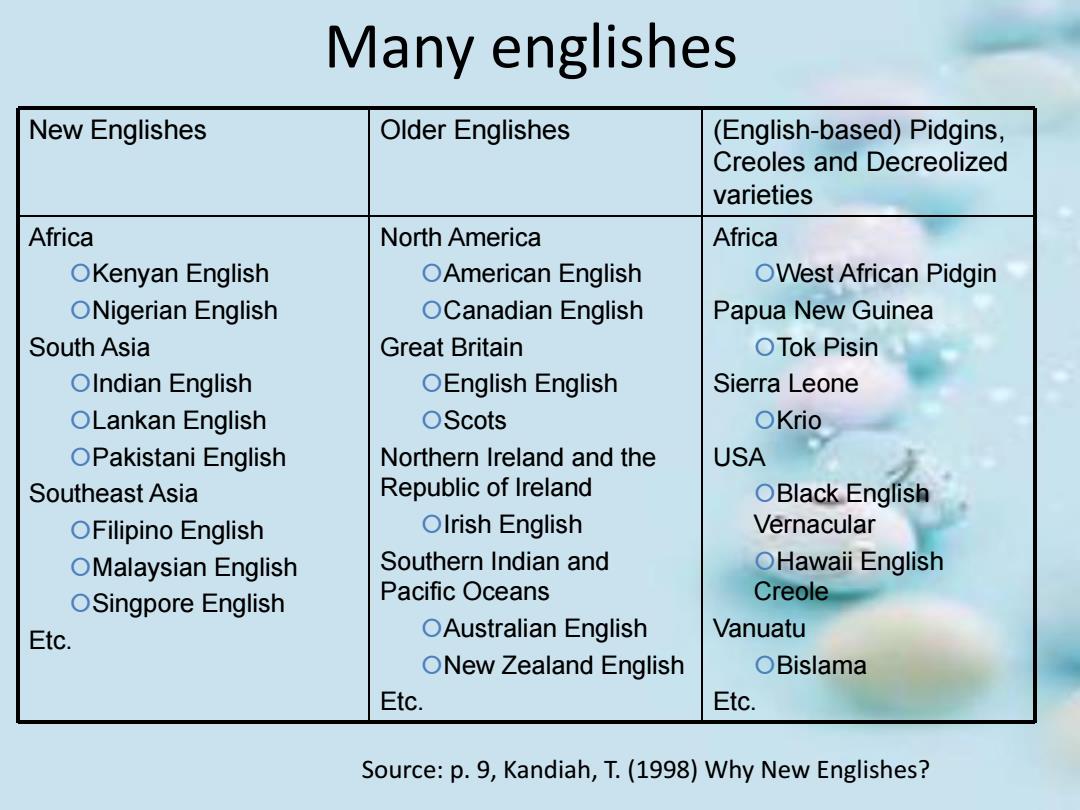
Many englishes New Englishes Older Englishes (English-based)Pidgins, Creoles and Decreolized varieties Africa North America Africa OKenyan English OAmerican English OWest African Pidgin ONigerian English OCanadian English Papua New Guinea South Asia Great Britain OTok Pisin OIndian English OEnglish English Sierra Leone OLankan English OScots OKrio OPakistani English Northern Ireland and the USA Southeast Asia Republic of Ireland OBlack English OFilipino English OIrish English Vernacular OMalaysian English Southern Indian and OHawaii English OSingpore English Pacific Oceans Creole Etc. OAustralian English Vanuatu ONew Zealand English OBislama Etc. Etc. Source:p.9,Kandiah,T.(1998)Why New Englishes?
Many englishes New Englishes Older Englishes (English-based) Pidgins, Creoles and Decreolized varieties Africa ¡Kenyan English ¡Nigerian English South Asia ¡Indian English ¡Lankan English ¡Pakistani English Southeast Asia ¡Filipino English ¡Malaysian English ¡Singpore English Etc. North America ¡American English ¡Canadian English Great Britain ¡English English ¡Scots Northern Ireland and the Republic of Ireland ¡Irish English Southern Indian and Pacific Oceans ¡Australian English ¡New Zealand English Etc. Africa ¡West African Pidgin Papua New Guinea ¡Tok Pisin Sierra Leone ¡Krio USA ¡Black English Vernacular ¡Hawaii English Creole Vanuatu ¡Bislama Etc. Source: p. 9, Kandiah, T. (1998) Why New Englishes?

Reasons for many varieties of English Development of language in"new and unfamiliar contexts" - Contexts marked by different ecological,cultural, linguistic,social,etc.characteristics
Reasons for many varieties of English – Development of language in “new and unfamiliar contexts” – Contexts marked by different ecological, cultural, linguistic, social, etc. characteristics
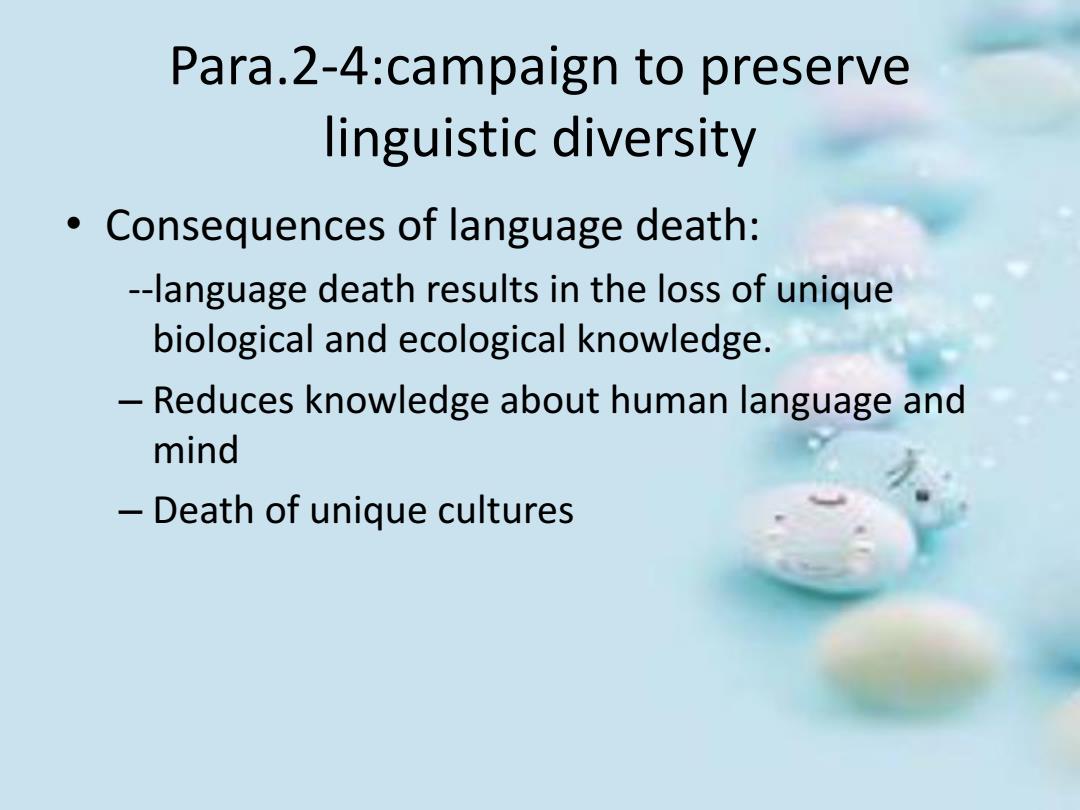
Para.2-4:campaign to preserve linguistic diversity . Consequences of language death: --language death results in the loss of unique biological and ecological knowledge. -Reduces knowledge about human language and mind Death of unique cultures
Para.2-4:campaign to preserve linguistic diversity • Consequences of language death: --language death results in the loss of unique biological and ecological knowledge. – Reduces knowledge about human language and mind – Death of unique cultures

Can dying languages be maintained? Serious attempts from mid-20th century in US,Australia,Europe Subjects in school,media,education Success is limited economic and cultural factors
Can dying languages be maintained? • Serious attempts from mid-20th century in US, Australia, Europe • Subjects in school, media, education • Success is limited – economic and cultural factors